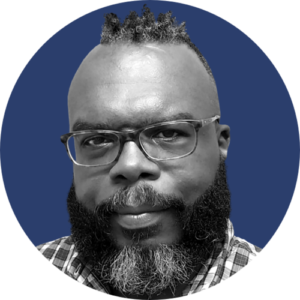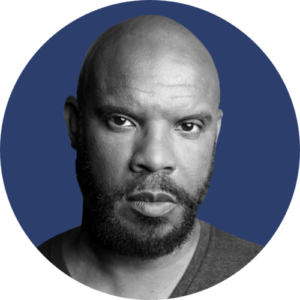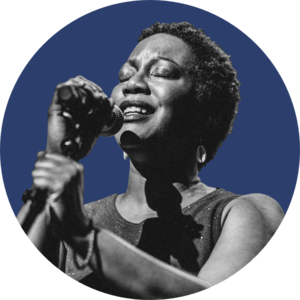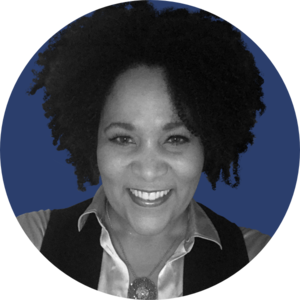Black Americans were eager to lend their resources to the Union cause from the onset of the Civil War, and called on generals and government officials to allow them to enlist.
While that call was initially rejected, the Union eventually changed their stance and agreed to allow Black men and women to join their ranks. That decision ultimately shifted the tide of the war and opened new avenues for Black people to seize their freedom.
View Transcript
Kidada Williams: In 1861, Harry Jarvis was waiting for an opening. Watchful, wiry, and shrewd, Harry was enslaved on Virginia’s Eastern Shore. And the long shadow of the growing Civil War had tightened his attention toward escape.
Harry Jarvis: My master, he was the meanest man on all the Eastern Shore, and that’s a heap to say. It’s a rough place. Finally, he shot at me one day and I reckoned I’d stood it about as long as I could, so I took to the woods. I lay out there for three weeks…I had friends who kept me informed how things were going on, and brought me food.
KW: One night, his enslaver held a raucous birthday party, and Harry seized his chance.
HJ: I knowed they’d all be a drinking and carousing night and day, and all the servants be kept home, so I took the opportunity to slip down to the shore in the night, got a canoe and a sail, and started for Fort Monroe.
KW: He crossed thirty-five miles of choppy water across the Chesapeake Bay. At night. Alone.
HJ: Didn’t appear as if I’d ever get to land.
KW: But Harry knew he would rather drown in the Chesapeake than turn back for the shelter of the forest and risk being reenslaved.
HJ: You see it was death behind me, and I didn’t know what was ahead, so I just asked the Lord to take care of me, and by and by the wind went down to a good steady breeze straight for Old Point, and the next morning I got safe to the Fort.
KW: Harry Jarvis, who had sailed a makeshift boat across 10 leagues of troubled water, was now out of bondage. But was he free? Not quite. Harry knew that his former captor could show up at Fort Monroe at any time and force him back into servitude. So he appealed to the Fort’s commanding General, Benjamin Butler, to allow him to become a soldier and claim his freedom.
HJ: I went to him and asked him to let me enlist, but he said it wasn’t a Black man’s war. I told him it would be a Black man’s war before they got through.
KW: Harry Jarvis was right: it was a Black man’s war. And Black people wanted to and would fight in it. This is Seizing Freedom.
Susie King Taylor: I learned to handle a musket very well, and could shoot straight and often hit the target.
Lewis Douglass: This regiment has established its reputation as a fighting regiment. Not a man flinched, though it was a trying time.
Jacob Christy: I do really think that it’s God’s will that this war Shall not end till the Colored people get their rights. It goes very hard for the white people to think of it.
KW: On this show, you’ll hear how Black people fought to liberate themselves during the Civil War and how they gained political power during Reconstruction, despite every attempt at violent suppression. I’m Dr. Kidada Williams. I make my living studying stories from the past.
I’m a historian, published author, and professor of U.S. History, with a focus on African Americans. So, the stories I go looking for and spend the most time with usually involve them. But like many of us, I didn’t learn much about the Civil War or Reconstruction in school.
We were told that the Emancipation Proclamation and Union victories, “freed the slaves.” But, stories from the past show so much more went into abolishing slavery in America than official declarations and battlefield victories. Black people battled for their own freedom, taking incredible risks for a country that had actively denied their right to it.
After the Civil War, they made freedom real by organizing for equality and justice during Reconstruction. Freedom gets built up over time—through a billion tiny, everyday acts. It’s there in the chance to enlist and fight for a cause. It’s there in the effort to reunite families, torn apart by the cruelty of slave trading. It’s there in the right to learn to read or found a church or decide how you want to make a living. And, it’s there in the insistence on the legal recognition of the right to do all these things.
That’s the freedom you’ll learn about on this podcast. And you’ll hear how Black people seized it in their own words.
Lewis Douglass: We are on the eve of another fight and I am very busy and have just snatched a moment to write you.
Jacob Christy: There had been a great deal of talk of them killing all the Colored soldiers that they catch.
Susie King Taylor: I was able to take a gun all apart and put it together again.
KW: All of the stories on this show are drawn from archives of voices from American history that have been muted time and time again.
Samuel Christy: My dear sister…
KW: Letters sent home from Black soldiers…
Samuel Christy: I have took my pen in hand to let you know I am well.
KW: …diary entries by Black school teachers…
Rosanna Henson: A hard life this!…I have four children to support and I find this a great struggle.
KW: …or autobiographies and interviews with people like Harry Jarvis.
HJ: I told him it would be a Black man’s war before they got through.
KW: You’ll also hear just how far some white people were willing to go, even after the end of slavery, to keep their power and undo the progress African Americans and their allies achieved.
Our series starts with enlistment. Black servicemen and women transformed the ranks of the Union army—and despite dangers of violence on and off the battlefield, their labor was essential to shifting the tide of the Civil War.
From the onset of the war, Black citizens were anxious to lend their resources to the Union cause.
William A. Jones: Sir: Very many of the Colored citizens of Ohio and other states…have had a great desire to assist the government in putting down this injurious rebellion…
Officer 3: But sir give us a commander who will appreciate us as men and soldiers, And we will be willing to surmount all outer difficulties
William A. Jones: They have urged me to write and beg that you will receive one or more regiments (or companies) of the Colored of the free States.
Officer 4: …to share the dangers of the battlefield and not be kept for men who will not fight If the world doubts our fighting give us a chance and we will show then what we can do.
KW: But The Union was slow on the uptake. “Don’t you know that this is a white man’s government,” one Union governor said, and “that white men are able to defend and protect it?”
It took a year of fighting for Congress to realize their mistake—that they wouldn’t have enough white men to do the killing, dying, and labor needed to win the war. And a year of listening to abolitionists like Frederick Douglass, before they started to change their minds.
Frederick Douglass: A war undertaken and brazenly carried on for the perpetual enslavement of Colored men, calls logically and loudly for colored men to help suppress it.
KW: The kinds of freedom Black people could seize and when — even the freedom to fight and die for the Union — became available to different people from different places at different times. In 1862, Congress authorized the enlistment of already free Black men like Cornelius Gardner:
Cornelius Gardner: Frederick Douglass told Abe Lincoln, ‘Give the Black man guns and let him fight.’ And Abe Lincoln say, ‘If I give him a gun, when it comes to battle he might run.’ And Frederick Douglass say, ‘Try him, and you’ll win the war.’ And Abe said, ‘All right, I’ll try him.’”
KW: Lincoln wasn’t ready to officially try formerly enslaved men like Harry Jarvis, though. So back at Fort Monroe, Harry Jarvis found some civilian work to do. It wasn’t long before he saw first-hand that a struggle to make it across Union lines didn’t guarantee freedom.
HJ: One day I saw a man given up to his master that came for him and I concluded that was not the place for me, so I hired onto a ship going to Cuba and then on one going to Africa and was gone for nearly two years.
KW: Harry eventually made his way back to the U.S. He got lonely living as a stranger in a strange land and wanted to reunite with his wife. Unfortunately for him, she had since…married another man. But! The Union had also had a change of heart in his absence. In 1863, Lincoln issued the Emancipation Proclamation, allowing all Black men—born free or formerly enslaved—to enlist.
HJ: When I landed in Boston, I found that it had got to be a Black man’s war for sure. I tried to enlist in the 54th Massachusetts…but it was just full. So I was one of the first that enlisted in the 55th. And I fought with it til the battle of Folly Island. There I was wounded three times…but I kept on fighting til a ball struck my leg and I fell…I should have bled to death if all our men hadn’t been drilled in using a tourniquet and supplied with bandages. I just had time to stick my knife in the knot and twist it tight before I fainted.
KW: James L. Smith—formerly enslaved in Virginia—was born with a disability and couldn’t fight in 1863. But his autobiography is filled with admiration for the Black soldiers that he saw filling up ranks in Massachusetts:
James L. Smith: They have come forward by thousands, and rallied around the so called “banner of the free,” hoping that by preserving it from the hands of the enemy to make our dear beloved country free…after two hundred years or more of oppression and injustice, and having not only their rights as citizens, but their manhood ignored; and, besides, a thousand other wrongs calculated to kill the patriotism in any other than a Black man.
KW: Frederick Douglass continued to sound the call for enlistment, encouraging men who were born free and who could free themselves to seek out the Union army:
FD: Massachusetts now welcomes you to arms as soldiers. She has but a small Colored population from which to recruit. Go quickly and help fill up the first Colored regiment from the North. I have implored the imperiled nation to unchain against her foes, her powerful Black hand.
KW: Even in the North, a “powerful Black hand” was understood as a threat. Though the North and South were at War, most whites were still united in their belief in white supremacy.
JLS: Pen cannot begin to describe the extreme sufferings of the Colored men in this respect. The Yankee soldiers were eager for glory; the idea of having a Colored man in the ranks caused many of them to be angry. “I will never die by the side of a n—-r,” was uttered from the lips of many.
KW: White Union-supporting Democrats in the North saw Black men with guns as a disaster for all white people. They thought equal access to military training might come with retaliation for all the wrongs of slavery.
Some Northern whites even interpreted Black action on the battlefield as anti-white murder—and thought that the Black people on their own side of the conflict should be punished for having the audacity to kill whites on the other side.
When word got around that Black Union soldiers had taken over a Rebel farm, a Democratic newspaper in Pennsylvania wrote this:
Democrat & Sentinel: Yes, the work of the indiscriminate slaughter of the white men, women, and children of the South, by Black brutes in Federal uniform, has commenced. When Mr. Lincoln shall have raised his Black army of 300,000 negroes, this ‘carnival of murder and lust’ will have attained its height.
KW: These white northern writers hated Lincoln for deploying Black troops. White Union enlisted men had signed up to preserve their country, or fought out of a sense of honor and duty, but most did not sign up to fight for Black people to be free. And certainly not to fight alongside them.
D&S: The ‘honor of our flag’ is to be upheld by these barbarians—our liberties are to be maintained by arming these imbruted wretches, and allowing them to outrage and slaughter helpless women and children and decrepid old men, whether Unionist or Secessionist, for the negro knows no difference between them.
KW: Black men did understand the difference. Although many white people on both sides of the conflict assumed (or hoped) that Black men wouldn’t fight, those predictions proved deeply wrong.
Over the course of the war, over 70 percent of northern Black men of military age would serve. But not all Black people who wanted to enlist could formally join the Union Army. Soldier Louis Hughes reported:
Louis Hughes: Two slaves belonging to…one of our nearest neighbors, had tried to escape to the Union soldiers, but were caught, brought back and hung. I never shall forget the horror of the scene ⎯ it was sickening. The bodies hung at the roadside, where the execution took place, until the blue flies literally swarmed around them, and the stench was fearful.
This barbarous spectacle was for the purpose of showing the passing slaves what would be the fate of those caught in the attempt to escape, and to secure the circulation of the details of the awful affair among them throughout all the neighborhood.
KW: Instead of risking escape and recapture, many others stayed where they were—and enlisted in a different army, a “Slaves’ Army.” They formed small guerilla battalions that fended off Confederate advances or organized slave rebellions.
One of those rebellions was conducted in the lowcountry stronghold of Pineville, South Carolina, and headed by a woman named Rose. Rose helped lead a band of armed freedom seekers in raiding plantations for weapons and planning to overthrow the slavocracy.
Georgiana De Veaux: We have two kinds of enemies to contend with, our negro outlaws & the Yankees.
KW: In 1865, with the Union Army advancing in the fore and enslaved people waging their own War in the rear—some planters pressed Confederate officials to send soldiers back from the battlefield to help suppress full scale slave rebellions. Pineville’s planter women tracked Rose and her band’s movements, as they clashed with plantation owners and Confederate scouts.
Susan Jervey: What I most fear, is not the Yankees, but the negroes, cut off from all help from across the river, and at their mercy, what will become of us? Pineville seems completely given up to them…The Moorfield negroes are crazy quite; helping in the sack of the houses.
Georgiana De Veaux: …we are under a constant state of excitement and danger…Pineville is filled with rebellion and negroes are all deranged about freedom…Those who are for you today are against you tomorrow; the scouts say this is the worst part of the country they have ever had to contend with.
KW: The insurrection lasted for weeks, before Confederate guerillas captured, tortured, and executed many of the known rebels, including Rose. Confederates quashed the Pineville rebellion, but they could not vanquish the “Slaves’ War” for freedom.
These informal fighters didn’t leave many records. We know about them because their descendents survived and told their stories or their enslavers documented their activities.
What we do have are the letters of enlisted Black soldiers like Jacob, Samuel, and William Christy. Enlistment was relatively easy for them—they were born free in Chambersburg, Pennsylvania.
While they were training in Boston and fighting in the Carolinas with the Fifty Fourth Massachusetts—the regiment that Harry Jarvis tried to join, but found full—the brothers regularly wrote home to their sister, Mary Jane.
Jacob Christy: Dear sister,
Samuel Christy: My Dear Sister,
I have took my pen in hand to let you know that I am well and I hope that these few lines may find you enjoying the same state of health.
JC: We are very well pleased with soldiering, but we won’t have it so easy when we leave Boston.
SC: I will send you my likeness as soon as I can get it taken. The regiment are full now and we got our uniform and arms.
JC: They are Springfield rifles that can kill at great distance. It is very cold out here now, but I think when we go down South it will be warm enough—and warmer then we wish!
William Christy: We were on Saint James Island on the 16th of July…We all arose and formed a line. The artillery opened fire on the rebels and drove them back. I was struck on the breast plate with a ball and that was all that save me. It was through gods will that the ball struck the plate. If I live to get home, I will fetch the plate home with me if I can.
JC: …I do really think that it’s God’s will that this war Shall not end till the Colored people get their rights. It goes very hard for the white people to think of it. But by God’s will and power they will have their rights, us that are living now may not live to see it. I shall die a trying for our rights so that others that are born hereafter may live and enjoy a happy life. If we can’t get our rights, we will die trying for them.
KW: The Christy Brothers fought in the 54th alongside Frederick Douglass’ own son, Lewis. Their all-black regiment mounted a harrowing, if hopeless, attack at Fort Wagner in 1863. Lewis wrote about the dogfight to his sweetheart back home.
Lewis Douglass: My dear Amelia, I have been in two fights, and am unhurt…My thoughts are with you often, you are as dear as ever…we are on the eve of another fight and I am very busy and have just snatched a moment to write you. I must necessarily be brief.
This regiment has established its reputation as a fighting regiment—not a man flinched, though it was a trying time. Men fell all around me. A shell would explode and clear a space of twenty feet, our men would close up again, but it was no use we had to retreat, which was a very hazardous undertaking.
How I got out of that fight alive I cannot tell, but I am here. My Dear girl I hope again to see you. I must bid you farewell should I be killed. Remember if I die I die in a good cause. I wish we had a hundred thousand colored troops we would put an end to this war. Good Bye to all. Write soon. Your own loving Lewis.
KW: Even though serving in the Union meant hazarding death, black men were adamant about having a hand in their own liberation. For many, freedom from slavery included the freedom to choose to enlist.
Samuel Cabble: Dear Wife, I have enlisted in the army. I am now in the state of Massachusetts but before this letter reaches you I will be in North Carolina and though great is the present national difficulties, yet I look forward to a brighter day when I shall have the opportunity of seeing you in the full enjoyment of freedom….
KW: Black soldiers’ commitment to the Union cause meant that men like Samuel Cabble and James Herney were separated from their families.
James Herney: I enlisted January the 4th 1864 under Col Russel. When I left my family I promised them that I would come home on furlough. In August last, I lost two of my children and I asked for a leave of absence and was refused…there has been a great many of my fellow soldiers who through grief and anxiety about their families have pined away and died…
KW: Being on the battlefield put Black soldiers directly in the line of fire, but their families also suffered because of their enlistment. Before 1865, soldiers’ families weren’t automatically free just because their fathers, husbands, or brothers joined the ranks. Those left behind in slavery were subjected to violent retaliation:
Patsy Leach: I am a widow and belonged to Warren Wiley of Woodford County Ky. My husband Julius Leach was a member of the U.S. Colored Cavalry and was killed at the Salt Works Va. about six months ago…
When my husband was Killed my master whipped me severely saying he had gone into the army to fight against white folks. When he had whipped me he said “…damn you. When I am done with you tomorrow you never will live no more.” I knew he would carry out his threats so that night about 10 o’clock I took my babe and travelled to Arnold’s Depot where I took the Cars to Lexington. I have five children, I left them all with my master except the youngest. And I want to get them but I dare not go near my master, knowing he would whip me again.
KW: Most likely, Patsy Leach’s husband escaped slavery to enlist. Some men chose not to put their families at risk by leaving them to the whims of the white planter class, however. They meant to stay home so that they could provide for their loved ones. But through “impressment,” the Union forced some free Black men into its ranks.
John Banks: My name is John Banks…On the 2nd day of December 1863, I was cutting wood in the woods about a mile from my house when a number of colored soldiers, armed (probably about ten men) came upon me and asked me to enlist. I told them that I could not enlist because I was obliged to do the work for my family. They then obliged me to go to Newport News to see Captain Montgomery, their Commanding officer.
KW: Ironically, that same Union that denied Black enlistment in the early years of the war could also be found taking men from their families unwillingly:
JB: I was then sent the same day to Craney Island on a tug, surrounded by armed soldiers, just as though I was a prisoner. I was detailed for duty in the Quartermaster’s Department at Norfolk five days, part of which time I was under guard, so that I could not even go to get a drink of water without an armed soldier going with me…a soldier told George Marrow and me that if we didn’t enlist he would put the contents of his musket into us.
KW: In this way, some Black soldiers who fought for the Union were forced to be there—just as enslaved men were put to work for the Confederacy. You may have heard stories of Black soldiers loyal to the Confederates: It didn’t happen. When slavery determines the course of your life and you’re forced to build ramparts or move cannons for people who hold you in bondage, the Confederate “battlefield” is just another plantation.
While men were heading into their first battles for the Union, Black women were also finding their place in the field—even if they couldn’t enlist as soldiers.
KW: Susie King Taylor was born in Savannah, Georgia, and subject to laws that controlled her life and movement. In the early 1860s, all Black people in Georgia needed permission from a white person to be out past nine at night. And, educating Black people was against the law. But Susie was lucky; she attended two clandestine schools taught by black women where she learned to read and write.
Her family fled to Fort Pulaski—which was recently captured by Union forces. And Susie found work with the Thirty-Third U.S. Colored Troops. She traveled with them across the southeastern theater of the war.
SKT: The scenes are just as fresh in my mind to-day as in ’61. I see now each scene,–the roll-call, the drum tap, “lights out,” the call at night when there was danger from the enemy, the double force of pickets, the cold and rain.
KW: She quickly gained a reputation as the first Black army nurse. But she was also a laundress, cook, teacher, therapist…and an all-around badass.
SKT: I assisted in cleaning the guns and used to fire them off, to see if the cartridges were dry, before cleaning and reloading, each day. I learned to handle a musket very well, and could shoot straight and often hit the target. I thought this great fun. I was able to take a gun all apart and put it together again.
KW: Susie was born in 1848, which made her about fifteen years old. She witnessed some extraordinary—and traumatic—events on the front lines.
SKT: We arrived at Jacksonville about eight…in the morning, accompanied by three or four gunboats. When the rebels saw these boats, they ran out of the city, leaving the women behind.
Our regiment landed and marched up the street, where they spied the rebels who had fled. They were hiding behind a house about a mile or so away, their faces blackened to disguise themselves as negroes, and our boys…halted a second, saying, “They are black men! Let them come to us!” With this, firing opened and several of our men were wounded and killed.
KW: Over time, Susie got used to the mercilessness of being a Black woman embedded with Union forces in rebel-held South Carolina. But it was never easy.
SKT: Fort Wagner being only a mile from our camp, I went there two or three times a week. Outside of the fort were many skulls lying about; I have often moved them out of the path. The comrades and I would have quite a debate as to which side the men fought on. Some thought they were the skulls of our boys; others thought they were the enemy’s; but as there was no definite way to know, it was never decided which could lay claim to them. They were a gruesome sight, those fleshless heads and grinning jaws, but by this time I had become accustomed to worse things and did not feel as I might have earlier in my camp life.
KW: Susie King Taylor, who committed four years of her young life to the Union Army, was never paid a dime. Though maddening now, that wasn’t too surprising then. Soldiers’ pay varied not only by region and unit, but also from person to person. White soldiers were paid more than Black soldiers—but that was pretty much the only constant economic truth. Susie wasn’t a soldier, and the army probably considered her labor an exchange for a tent and rations.
Black women back home could receive payment from the Union through their enlisted male relatives. That meant that the stakes of payment for black soldiers, who needed money to support their dependent families, were high.
Rosanna Henson: My husband who is…now in the Macon Hospital at Portsmouth with a wound in his arm…has not received any pay since last May and then only thirteen dollars…I have four children to support and I find this a great struggle. A hard life this! I, being a Colored woman, do not get any State pay. Yet my husband is fighting for the country.
KW: Rosanna Henson wasn’t getting any money from the government. Other women, like Ann Carney, had to contend with their money being stolen by enslavers:
Ann Carney: My Dear Husband I received your letter…but have got no one till now to write for me. They are treating me worse and worse every day. Our child cries for you. Send me some money as soon as you can for me and my child are almost naked…Do not send any of your letters to Hogsett especially those having money in them as Hogsett will keep the money…Do the best you can and do not fret too much for me for it won’t be long before I will be free and then all we make will be ours.
Your affectionate wife, Ann.
P.S. Send our little girl a string of beads in your next letter to remember you by.
KW: Inconsistent payment became a major bone of contention in the case of the Thirty-sixth U.S. Colored Troops in North Carolina.
James Henry Gooding: In the first year of the war…the Black man begged the privilege of aiding his country in her need, to be…refused. And now he is in the War, and how has he conducted himself?…Obedient and patient and solid as a wall are they. Now your Excellency, we have done a Soldier’s duty. Why can’t we have a Soldier’s pay?
KW: In April of ‘63, negotiations between Union recruiters and freedmen in New Bern began to break down. Edward W. Kinsley, a white officer who had committed himself to the recruitment of more than 10,000 Black troops, was desperate.
One day, Officer Kinsley received a letter, telling him to arrive at midnight at the house of Mary Ann Starkey, a free Black teacher. There, he was promptly blindfolded and led up a winding set of stairs to the attic.
Edward W. Kinsley: When the bandage was removed I could see, by the dim light of the candle, that the room was nearly filled with blacks. And right in front of me stood Abraham Galloway.
KW: Abraham Galloway was a spokesman for the Black community of New Bern. He had emancipated himself from slavery in 1857 and escaped to Ontario—but he returned at the start of the war to spy for the Union. And now he was standing in Mary Ann Starkey’s attic, flanked by another man of formidable size. Abraham lifted his revolver from his waistband and placed it to the bridge of Officer Kinsley’s ear.
Abraham Galloway: If you’d prefer to exit this room with your brain between your ears, we ask kindly that you make the following oath. That any Colored man enlisted in North Carolina will have the same pay as their Colored brethren enlisted in Massachusetts; our families will be provided for; our children will be taught to read; and if we should be taken prisoner, the government will see to it that we are treated as prisoners of war.
EWK: To all of this, I made oath…and I was then conducted out of the house.
KW: The next day the word went forth, and the Blacks came to the recruiting station by hundreds and a brigade was soon formed. The fight for sufficient, consistent, and equal pay was about more than money—it was also about principle. The dignity afforded a soldier. And the glory of manhood in war.
But even with the sorts of local commitments that came out of places like New Bern, Black soldiers couldn’t be promoted to Captain (or beyond). The white desire to keep Black soldiers off the battlefield, and to hoard the privileges that usually came with military service, persisted. Even the most highly skilled men were put to work digging ditches or doing basic carpentry.
Sometimes, life was just boring. Infantry Sergeant Major Christian A. Fleetwood kept a diary during his service.
Christian A. Fleetwood: Lying in woods all day. Nothing new. Turned out at Midnight—an attack being made. Moved out, but were not called upon. Weather fine and warm.
KW: When Sergeant Major Fleetwood was transported by steamship to fight in North Carolina, he discovered he wasn’t really cut out to be a sailor.
CAF: Friday, December 16, 1864. Still imprisoned [a]board Steamship Monotony, varied by catching Fish for supper. Tired, Tired, Tired! oh! how I long to feel solid ground again. Inclined to the belief that my former fondness for the ocean was bosh. “Rocked in the cradle of the deep,” is very good poetry but hang the reality.
KW: Sergeant Major Fleetwood’s moment would come. That same year, he received the Medal of Honor for his actions on land. A split second after his regiment’s flag-bearer had been shot, Fleetwood swooped in to grab the flag before it could touch the ground. He then used the flag to rally his fellow troops to keep fighting.
Meanwhile, the war was reaching deeper into Northern territory than the Union thought possible. And free Black people living on free soil were realizing that they wouldn’t stay free if the Rebel army got a hold of them. To them, Black people, especially soldiers, were someone’s escaped property – no matter what their legal status was or where they were captured.
Fear that her South Carolina Volunteers would be captured by Confederates kept Susie King Taylor up at night:
SKT: How anxious I would be, not knowing what would happen before morning! Many times I would dress, not sure but all would be captured. Other times I would stand at my tent door and try to see what was going on, because night was the time the rebels would try to get into our lines and capture some of the boys. It was mostly at night that our men went out for their scouts, and often had a hand to hand fight with the rebels, and although our men came out sometimes with a few killed or wounded, none of them ever were captured.
KW: When the Confederate Army first came to Chambersburg—the Christy Brothers’ hometown—one of the local papers reported:
Franklin Repository: Quite a number of negroes, free and slave–men, women and children–were captured … and started South to be sold into bondage. One negro effected his escape by shooting and seriously wounding his rebel guard. He forced the gun from the rebel and fired, wounding him in the head, and then skedaddled. Some of the men were bound with ropes, and the children were mounted in front or behind the rebels on horses.
KW: The Franklin Repository wrote that only fifty people were dragged into slavery—while most of the white people sat quietly. But more recent estimates place that number in the hundreds.
James L. Smith: Can a people into whose hands arms have been placed, and who have been drilled in the art and science of war, become again slaves? And can this nation, that has advanced so rapidly in the cause of freedom, go backwards so, much as to re-enslave a people that have assisted in fighting its battles? Forbid it, justice! forbid it, humanity! forbid it, ye spirits of our fathers, still hovering over us! forbid it, Country! forbid it, Heaven!
KW: By the end of 1863, a dreadful rumor started to swirl: that enslavement, or re-enslavement in some cases, wasn’t the only penalty that the Confederates had in store for Black soldiers.
Jacob Christy: There was a rebel’s boat that came down to our fleet with a flag of truce, it came from Charleston to exchange prisoners and they said that they had some prisoners out of our regiment…I was very glad to hear that they had not killed them. There had been a great deal of talk of them killing all the colored soldiers that they catch.
KW: In 1864, the Confederate Congress made that rumor into a promise. It passed a law that permitted the legal killing of captured Black troops—and any white troops serving alongside them. Even if they were surrendering.
Franklin Repository: The Colored soldiers threw down their guns and raised their arms in token of surrender, but not the least attention was paid to it. They continued to shoot down all they found.
KW: That’s the Franklin Repository again, reporting on the aftermath of a battle at Fort Pillow. Fort Pillow, on the western border of Tennessee, had been conquered by the Union in the summer of 1863. Now in 1864, as the winter weather gave way to a Tennessee spring, 1,200 Confederates were trying to take it back. Defending the fort on the Union side were only 600 men from the surrounding areas—almost evenly divided between Black and white soldiers. Fighting started around 10 a.m.
FR: The negro troops fought most gallantly until overpowered, but they were outnumbered immensely and were overcome.
KW: Within hours, the Union army was in retreat. Surrendering soldiers—who would normally be taken to a prisoner of war camp—were gunned down. The U.S. government would later call it a massacre.
Ransome Anderson: Most all the men that were killed on our side were killed after the fight was over. They called them out and shot them down.
Jacob Thompson: I went up in the fort and fought with the rest. I was shot in the hand and the head after I surrendered. the man who shot me said ‘G–d d–n you, I will shoot you.’
RA: Then they put some in the houses and shut them up, and then burned the houses. They were wounded and could not walk.
JT: They nailed some black sergeants to the logs, and set the logs on fire. When I went there in the morning I saw them; they were all burning together.
RA: I heard them hollering there when the houses were burning. I saw a rebel soldier take some grass and lay it by the door, and set it on fire. The door was pine plank, and it caught easily. It was barred with one of those wide bolts.
JT: They would call out a white man and shoot him down. And call out a Colored man and shoot him down! Do it as fast as they could make their guns go off.
FR: These deeds of murder and cruelty closed when night came on, only to be renewed the next morning, when the demons carefully sought among the dead lying about in all directions for any other wounded yet alive and those they killed.
KW: The Massacre at Fort Pillow was a war crime, committed on American soil, against Americans. It was also an act of racial terror, sending a clear message to Blacks and whites about the consequences of resisting the Confederacy. And just as acts of racial terror continue to electrify and enrage Black Americans today, Fort Pillow galvanized Black people to petition the federal government for retribution. Theodore Hodgkins wrote to the Secretary of War and Hannah Johnson wrote to the President.
Hannah Johnson: My son went in the 54th regiment. I am a Colored woman and my son was strong and able as any to fight for his country….
Theodore Hodgkins: Sir, Some Sixty or Seventy thousand of my…brethren now wear the uniform of the United States and are bearing the gun and sword in protecting the life of this once great nation…
HJ: Now I know it is right that a Colored man should go and fight for his country, and so ought to a white man…So why should not our enemies be compelled to treat him the same, made to do it…?
TH: If the murder of the Colored troops at Fort Pillow is not followed by prompt action on the part of our government, it may as well disband all its Colored troops for no soldiers whom the government will not protect can be depended upon…
HJ: Mr Lincoln, don’t you think you ought to stop this thing and make the rebels do the same by the Colored men? The rebels have lived in idleness all their lives on stolen labor…Will you see that the Colored men fighting now are fairly treated? You ought to do this, and do it at once. Not let the thing run along—meet it quickly and manfully and stop this mean, cowardly cruelty.
TH: Let the same number of rebel soldiers, privates and officers be selected from those now in confinement as prisoners of war captured at the west and let them be surrounded by two or three regiments of Colored troops who may be allowed to open fire upon them in squads of 50 or 100, with howitzers loaded with grape.
KW: Lincoln promised to retaliate if captured Black soldiers weren’t treated respectfully as prisoners of war. But he never made good on that threat. And knowing full well the horrors of what could happen to them, what had happened to their comrades at Fort Pillow, Black soldiers still would not abandon the Union army.
James L. Smith: Thanks be to God the Colored men, as soldiers, have shown to the world their true patriotism in their valor and courage, and displayed as dauntless bravery as ever illuminated a battlefield. Thousands have fought and died. They met death calmly, bravely defending the cause that we revere.
KW: At the close of the war, and the start of Reconstruction, nearly forty percent of Union forces occupying the former Confederacy, were Black.
Frederick Douglass: You do not hesitate. You do not doubt. The day dawns; the morning star is bright upon the horizon! The iron gate of our prison stands half open. One gallant rush from the North will fling it wide open, while four millions of our brothers and sisters shall march out into liberty.
KW: Susie King Taylor survived the Civil War and saved a copy of the order to disband, written by the General that commanded her unit.
SKT: General Order, No. 1. Comrades, the hour is at hand when we must separate forever, and nothing can take from us the pride we feel, when we look upon the history of…the first Black regiment that ever bore arms in defense of freedom on the continent of America.
KW: But because Black enlistment was delayed at the start of the war, and the Union disbanded its enlistees in order of seniority, a critical mass of Black soldiers stayed enlisted. But soldiers hadn’t fought this war alone. Their efforts were undergirded by the nearly half a million refugees from slavery, who made their way to Union camps that dotted the landscape of the conflict.
Mattie Brown: Mother said when she heard of freedom she took me in her arms and left. The first I can recollect she was cooking for soldiers at the camps at Montgomery Alabama.
KW: But those legions of intrepid freedom seekers would soon discover that the protection the Union would offer was often deeply imperfect.
Next week on Seizing Freedom, we’ll dive into Civil War Refugee Camps with first-hand accounts from those who were there. But first…I’ll speak with Crystal Feimster—historian and professor of African American studies—about what it means to tell stories about Black people in the Civil War today.
Crystal Feimster: We know that once you center a different set of people, it requires asking different kinds of questions. And it actually means we come up with different conclusions.
KW: So how did you, as a Black woman, come to study the Civil War? What are we doing here?
CF: You know, I asked myself that question every day, girl. I think when I started presenting my work on the civil war, there was a lot of rumblings. People were like, she ain’t no civil war historian who she thinks she is rolling up in here, right?
Voice Actors

Andre Giles
Voice of James Herney

Candice Holley
Voice of Hannah Johnson

Chiquita Melvin
Voice of Patsy Leach

Conrad Haynes
Voice of Samuel Christy, Louis Hughes, Lewis Douglass

Dave Gau
Voice of Edward W. Kinsley

Eric Hollaway
Voice of Frederick Douglass, Christian A. Fleetwood

Frank Harrison, Jr.
Voice of Cornelius Gardner, Jacob Christy, Officer #3

James J. Johnson
Voice of Samuel Cabble, James Henry Gooding, John Banks

Jefferson A. Russell
Voice of William A. Jones, James L. Smith, Jacob Thompson

Joshua Moore
Voice of Abraham Galloway, Ransome Anderson

Louis Hampton
Voice of Harry Jarvis

Ozzie Wilson
Voice of Officer #4

Peter Jacobs
Voice of The Franklin Repository

Rachel Dilliplane
Voice of Georgiana De Veaux

Richelle Claiborne
Voice of Susie King Taylor

Sierra Doss
Voice of Rosanna Henson

Terry Menefee Gau
Voice of Susan Jervey

William Barnett
Voice of The Democrat & Sentinel

Episode Resources
The following resources were utilized in the research and creation of this episode:
- Abigail Cooper – “When I Get My Axe”: Military Service and Visions of Community in Refugee Camps of the American Civil War
- Albert Mann – History of the 54th Regiment
- Amy Taylor – Embattled Freedom: Journeys through the Civil War’s Slave Refugee Camps
- Andre Fleche and Peter C. Luebke, Encyclopedia Virginia – The United States Colored Troops
- Carter Woodson – The Mind of The Negro As Reflected In Letters Written During the Crisis
- Chandra Manning – What This Cruel War Was Over
- David Williams – I Freed Myself: African American Self-Emancipation in the Civil War Era
- Frederick Douglass – Men of Color, To Arms!
- Freedmen and Southern Society Project – Black Military Experience
- Freedmen and Southern Society Project – The Wartime Genesis of Free Labor: Lower South
- Freedmen and Southern Society Project – The Wartime Genesis of Free Labor: Upper South
- J. Stanley (as reprinted in Christian Recorder) – Tribute to a Fallen Black Soldier
- James Henry Gooding – Letter from Corporal James Henry Gooding to the President
- James Lindsay Smith – Autobiography of James L. Smith: Including, Also, Reminiscences of Slave Life, Recollections of the War, Education of Freedmen, Causes of the Exodus, etc.
- Jim Downs – Sick from Freedom: African-American Illness and Suffering during the Civil War and Reconstruction
- John W. Blassingame (Editor) – Slave Testimony: Two Centuries of Letters, Speeches, Interviews, and Autobiographies
- Leslie A. Schwalm – Surviving Wartime Emancipation: African Americans and the Cost of Civil War
- National Humanities Center – Civil War II: Soldiers
- National Humanities Center – Diary of Christian A. Fleetwood
- Report from 38th Congress, House of Representatives – Congressional Testimony on the Massacre at Fort Pillow
- Richard D. Sears – Camp Nelson, Kentucky: A Civil War History
- Samuel Cabble – Letter
- Susie King Taylor – Reminiscences of My Life in Camp with the 33d United States Colored Troops (Late 1st S. C. Volunteers)
- Thavolia Glymph – The Women’s Fight: The Civil War’s Battles for Home, Freedom, and Nation
- Valley of the Shadow – Christy Brothers’ Letters
- Valley of the Shadow – Newspaper Articles (Democrat & Sentinel, Franklin Repository)
